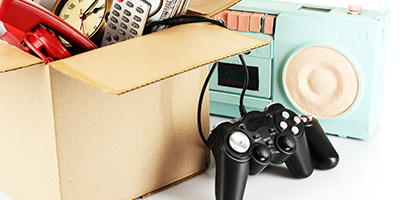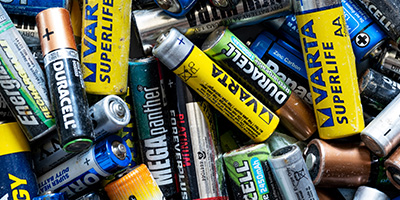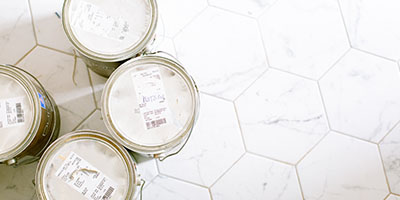How to Remove and Dispose of a Water Heater

How to Dispose of a Water Heater
Hot water heaters are one of those household appliances you never think about, unless it starts leaking or you see rust-colored water pooling in your tub. When that happens, you're suddenly faced with an unfamiliar question: "What do you do with an old water heater?"
Your answer will vary based on the recycling and disposal options for water heaters in your area, but before you get to that step you first need to learn how to remove it.
How to Remove an Old Water Heater
Step 1: Cut the Power
Your first step will be to disconnect the heater from its energy source, either the gas or electric line. If it's a gas heater, there should be a cutoff valve next to the tank or unit.
For electric heaters, you'll need to shut off the power at the main service panel. The appropriate circuit breaker should be labelled "Hot Water Heater" or something similar.
If you can't find the right one, cut the main power using the toggle switch at the top of the service panel. Once the power is off, attach a voltmeter to the copper wiring on both the white and black wires. If the voltmeter shows no reading, it is safe to disconnect the heater's wiring.

Water Heater Disposal Tip: Always Consult a Professional
If you have no experience working with electrical wiring, always consult an electrician before removing a water heater or other hard-wired appliance. Better still, have an electrician or HVAC professional disconnect the water heater for you.
Step 2: Shut Off the Water & Drain the Tank
Of course, removing a water heater requires removing the water already in the tank. Start by turning off the water supply using the cold-water intake valve. Next, open all the hot water taps in your house to let air into your pipes. This will force any remaining hot water back into the tank.
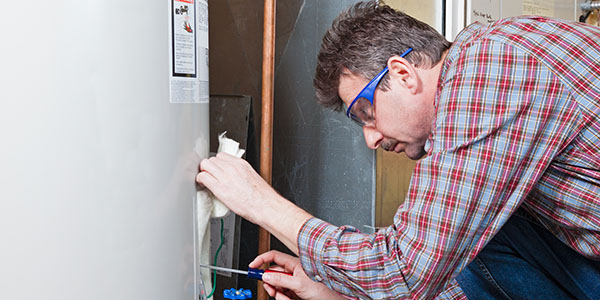
Now, connect a garden hose to the drain valve at the bottom of the tank, making sure the end of the hose is placed over a drain or in some other location where the water coming out won't damage anything. After you've opened the drain valve, the tank should empty itself out in 3 to 6 minutes.
Step 3: Remove the Water Tank
If the pipes run directly into your tank, known as "hard-plumbed," you'll need to saw them off before removing the tank. If the pipes are connected with unions, all you'll need is a wrench and a little elbow grease to finally disconnect and remove your water tank.
Where to Recycle a Water Heater
Don't rush to dispose of your water heater if it's still working. Instead, check to see if there are donation centers around you that will accept it. A few organizations to check out:
If your water heater is on its last legs, then recycling it is the next best option. How do you recycle a water heater? The first place you should look is your city's waste management department, as they may offer a recycling program for appliances. If these aren't available in your area, start looking into:
- Local recycling centers: Facilities that accept a variety of materials for recycling may also take old water heaters.
- Scrap metal collectors: Scrap metal companies often recycle water tanks and other appliances with high-value metals.
- Retailers & buyback programs: Check with local retailers, such as the one you’re buying your new one from, to see if they'll take your old one for recycling.

Water Heater Disposal Tip: Know Which Metals Are Gold
Most water heaters use brass or copper attachments, two metals that sell at a high price. However, the water tank itself is usually not worth much as most are made from plentiful steel.
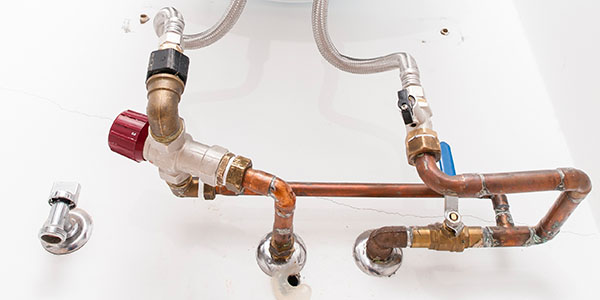
Where to Dispose of a Hot Water Heater
In some cases, recycling your water heater might not be an option. Fortunately, disposing of a water heater should be pretty easy no matter where you are.
- Bulk collection service: Your curbside collection service may offer bulk waste collection on certain days or weeks. However, you should call or look up their service info before placing your water heater on the curb. Some services may charge an additional fee.
- Community cleanup days: Many cities host regular community cleanup days that allow residents to throw out those items they can't dispose of in their trash can. Check to see if your city or county has one of these events on their calendar.
- Landfills: If all else fails, find a local landfill that accepts water heaters. Some facilities may prohibit water heater disposal due to the empty space inside the tank, which can collect hazardous gases and possibly damage the landfill.
Though it may take a bit more time and effort to safely remove and dispose of your water heater, remember that at the end of this particular project you’ll be able to enjoy a nice, warm shower.

